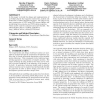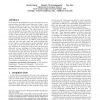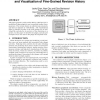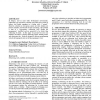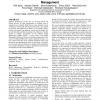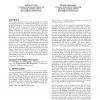119
click to vote
ECLIPSE
2007
ACM
15 years 3 months ago
2007
ACM
Programmers often copy and paste code so that they can reuse the existing code to complete a similar task. Many times, modifications to the newly pasted code include renaming all ...
121
click to vote
ECLIPSE
2007
ACM
15 years 6 months ago
2007
ACM
In evolutionary software development, knowing how design evolves with features can be valuable in guiding future projects. It helps answer questions like "How much upfront de...
108
click to vote
ECLIPSE
2007
ACM
15 years 6 months ago
2007
ACM
In this paper we detail the design and implementation of an Eclipse plug-in that supports construction, analysis and elaboration of Modal Transition Systems. The plug-in supports ...
141
click to vote
ECLIPSE
2007
ACM
15 years 6 months ago
2007
ACM
In the software development life cycle, unit testing is an important phase that helps in early detection of bugs. A unit test case consists of two parts: a test input, which is of...
112
click to vote
ECLIPSE
2007
ACM
15 years 6 months ago
2007
ACM
This paper presents a code-revision history collection and visualization Eclipse plugin for use in empirical studies of programmers. The revision history is collected non-intrusiv...
113
click to vote
ECLIPSE
2007
ACM
15 years 6 months ago
2007
ACM
The information in bug reports influences the speed at which bugs are fixed. However, bug reports differ in their quality of information. We conducted a survey among ECLIPSE devel...
ECLIPSE
2007
ACM
15 years 6 months ago
2007
ACM
In Eclipse, and in most other development environments, refactorings are activated by selecting code, then using a menu or hotkey, and finally engaging in a dialog with a "wi...
103
click to vote
ECLIPSE
2007
ACM
15 years 6 months ago
2007
ACM
Software development involves the use of many models and Eclipse provides an ideal infrastructure for building tools to support the use of models. While there is a large selection...
128
click to vote
ECLIPSE
2007
ACM
15 years 6 months ago
2007
ACM
We present a declarative and visual debugging environment for Eclipse called JIVE.1 Traditional debugging is procedural in that a programmer must proceed step-by-step and objectby...
ECLIPSE
2007
ACM
15 years 6 months ago
2007
ACM
The navigation of structural dependencies (e.g., method invocations) when a developer performs a change task is an effective strategy in program investigation. Several existing ap...

